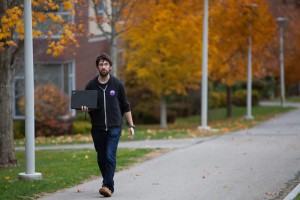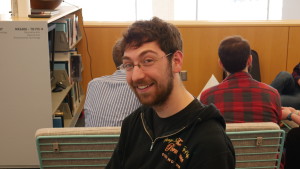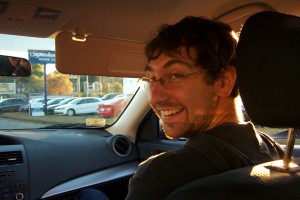
ABOUT SEAN LOWEN
Sean is currently an Olin student who will graduate in the Spring of 2016 with a major in Engineering: Robotics. Since he was admitted to Olin, he has worked for several startups and took a year off of school to start his own business with a fellow Olin student, Ben Kroop. Now that he is back at Olin, he has continued to share his passion for entrepreneurship by NINJAing Products and Markets, a first-year introductory entrepreneurship class. In his free time, Sean enjoys making movies, playing board games, and having interesting conversations.
Sean’s introduction to entrepreneurial thinking occurred during his gap year before beginning at Olin College. He worked with a professor from Rutgers-Camden, Dr. Rajiv Ghandi, on topics related to theoretical computer science. He spent the Fall semester at Rutgers University and the Spring semester in Mumbai. Sean considers this to be his first dip in entrepreneurial thinking because he followed a somewhat risky, atypical path because he saw the potential value in studying one-on-one with a professor and explore a new culture. (He wrote a blog about his time in India that you can read here.) He continued to develop his interest in the startup world when he interned at Securigin, a six person startup that improves mobile iOS security, and Planet Labs, a 30 person startup that makes small earth imaging satellites. While working for these companies he found a passion for entrepreneurship and the start-up culture and knew that one day he would start his own company.
Olin College Class of 2016
Major: Engineering: Robotics
Olin Activities: Products and Markets Ninja
Known For: CTO of Foobo
Interests: Volleyball, Soccer, Filmmaking
Places Worked: Rutgers University, Securigin, Planet Labs, Bungee, TechStars, Foobo
Favorite Color: Smaragdine
“Entrepreneurship is identifying problems and doing something
to fix them, or finding ways to create more value.”
STARTING A BUSINESS
Following his Junior year at Olin, Sean decided to take a year long leave of absence from school to pursue his own company. He wanted to explore his options outside of Olin, but didn’t solidify a plan until Ben Kroop, his soon-to-be business partner, propositioned him, “Hey, do you want to start a company?” Although Sean and Ben both went to Olin, they had only spoken to each other a few times before, but Sean decided to jump on the opportunity. The two set about ideating to determine what company they should start, and decided on Bungee, a website that helped people plan their vacations by using semantic search to recommend vacation destinations for users that knew what they wanted to do on vacation but did not know where they wanted to go. For example, you might tell Bungee that you want to hike in temperate weather, and it would give you a country/region based on your demands. Sean and Ben thought it would be a hit with college students planning spring break trips, or anyone who knew what they wanted from a vacation but didn’t know exactly where to get it. They built up an MVP of their product in a weekend, with 80 cities in their database and very basic functionality, pitched the idea to Rough Draft Ventures (a student-led subsidiary of General Catalyst Ventures), and secured some funding to pursue the company for the summer.
During the summer, the Sean and Ben rented space at Techstars in Boston and proceeded to build out Bungee. They added over 25,000 destinations, improved their semantic search algorithms, and tested the product with potential users. Nearing the end of the summer, they pitched their idea to Techstars, a start-up accelerator, knowing they weren’t at the right stage to be entered into the program, but eager to get more feedback. The Techstars team liked Ben and Sean, but were skeptical about the product. They flipped Sean’s opinion of Bungee by asking, “What is your plan to make this into a $20 million company?” This question really resonated with them, and he and Ben realized that the app was appealing to a small demographic and was more suited as a feature offered by a larger trip advising service than a stand-alone service. They decided to scrap Bungee and work for Techstars while figuring out what company to pursue next. At Techstars, he was able to help companies in the accelerator as a part time engineer and listen in on the advice mentors would give the companies in the program. Working at Techstars gave him an outside perspective on starting a company where he was able to learn from the mistakes and successes of startups in the program.
FOOBO
While at Techstars, Sean came up with the idea for Foobo, a personal robotic su chef. He came home late one night and wasn’t in the mood to make dinner and found himself wishing for a robot to do the work instead. He proposed it to Ben, and it was a hit. Ben and Sean determined that the idea was technologically feasible and began to research whether the idea could lead to a sustainable business. They began to research their market and after a few interviews with potential customers, they determined that the consumer market was not the best route. The general population was uneasy about robots in their homes, especially if it was going to be wielding a knife, so they pivoted to placing robots in restaurant kitchens. They went around Boston and talked to restaurants to see what were some of the issues in the kitchens. They discovered that restaurants were ready to bring robots into their business as it would improve the consistency of food quality, and lower the risk of food contamination since fewer hands would touch the food reducing cross contamination. Talking to these restaurants really boosted their confidence in going forward with Foobo and drove them to create a minimum viable product and a prototype.
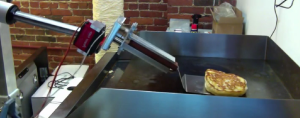
First prototype for Foobo, a robotic arm flipping a pancake on a griddle.
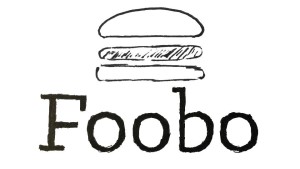
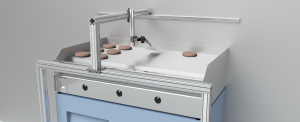
Minimum viable product for a CNC version of a burger flipping robot.
They started out constructing a robotic arm that would operate a griddle in the same manner as a human. There was even a discussion about whether they could make an arm that was so elegant it could be viewed as a hibachi chef and become an attraction of the restaurant. However, when they proposed their system to restaurant owners, they were told that the restaurant owners prioritized a compact system that took up less aisle space than a system with flair. Therefore, their second prototype resembled a CNC milling machine. It was a hand mounted to a gantry that rested over the griddle. They gave it a spatula, and soon it was flipping pancakes.
Unfortunately, after months of interviews, networking, and prototyping, it became obvious to Sean and Ben that the company was in a bit of a Catch-22. They needed more funding to build out their second prototype and install it in kitchens, but investors wanted to see the system in a restaurant before investing.
Looking back at this experience he has learned that starting a company is not as difficult as he originally imagined. He invested some money and submitted the paperwork to start a business, but it truly became meaningful when he started to treat Foobo as a real company instead of a project. Once he shifted his mindset to treating Foobo like a company, it forced him to present it in a professional manner and be serious about pursuing the success of this business. After a year of going through the ups and downs of creating a company, Sean decided to return to Olin to finish college and earn his diploma. He is in the process of deciding what he wants to do after Olin. Who knows what problems he will attempt to solve next.
